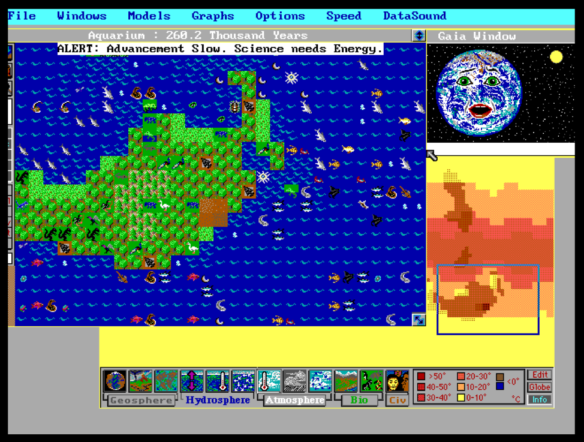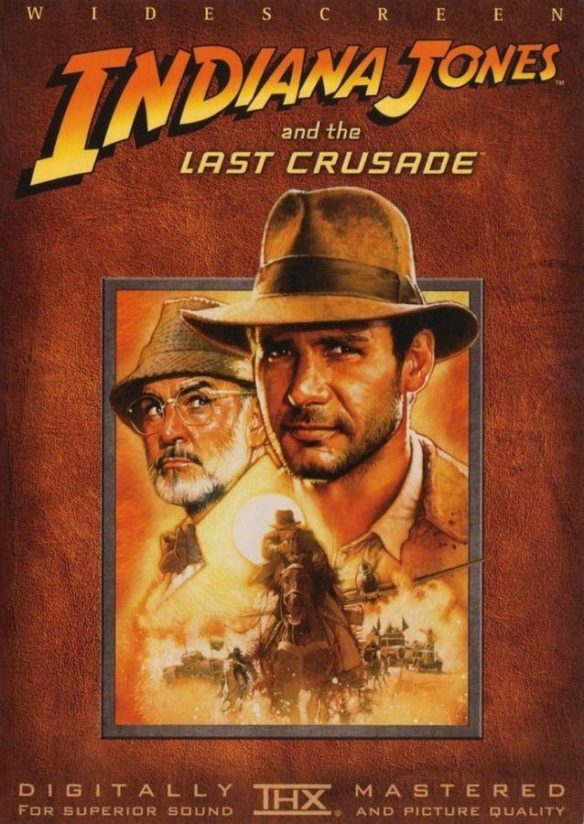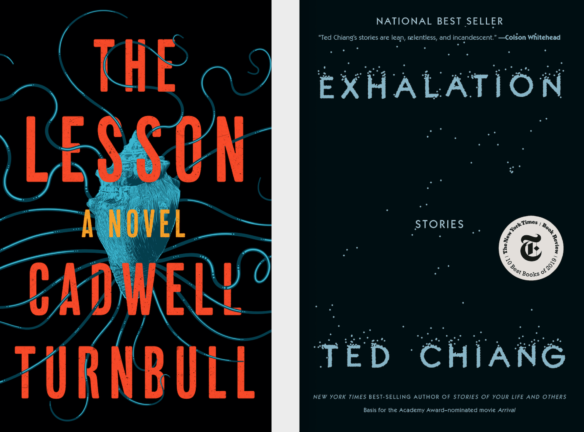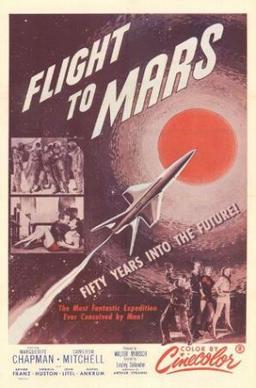(1) A TAIL OF SPACE. A new Star Trek: Discovery trailer. Complete with a certain feline.
(2) PARIS CALLING. Halfway through the Constelación Magazine Kickstarter, they are announcing their second special event – “Translation Station” with Aliette de Bodard and Cristina Jurado. Takes place October 23 at 7 p.m. Paris time (10 a.m. Pacific / 1 p.m. Eastern) Register here.
Our very own Cristina Jurado is hosting a chat with multi-award-winning author Aliette de Bodard. They’ll have a fascinating conversation about translations and languages, and whever else happens to come up.
To date the Kickstarter has raised $10,048 of their $18,000 goal.
(3) ONCE MORE INTO THE BREACH. In “Barnes & Noble Cyberattack” Locus Online signal boosts a warning to B&N customers:
Barnes & Noble CEO Darren Guccione warned customers to be “on high alert” following an October 10 data breach. The company notified customers via email.
While we do not know if any personal information was exposed as a result of the attack, we do retain in the impacted systems your billing and shipping addresses, your email address and your telephone number if you have supplied these… It is possible that your email address was exposed and, as a result, you may receive unsolicited emails… We currently have no evidence of the exposure of any of this data, but we cannot at this stage rule out the possibility….
(4) TOP 100 FANTASY LIST. TIME Magazine has anointed “The 100 Best Fantasy Books of All Time”
… To develop our list, we began in 2019 by recruiting a panel of leading fantasy authors—Tomi Adeyemi, Cassandra Clare, Diana Gabaldon, Neil Gaiman, Marlon James, N.K. Jemisin, George R.R. Martin and Sabaa Tahir—to join TIME staff in nominating the top books of the genre (panelists did not nominate their own works). The group then rated 250 nominees on a scale, and using their responses, TIME created a ranking. Finally, TIME editors considered each finalist based on key factors, including originality, ambition, artistry, critical and popular reception, and influence on the fantasy genre and literature more broadly.
The result is a list that underscores the imaginative breadth of fantasy fiction—from early roots in the oral storytelling tradition that brought about works like The Arabian Nights, to modern classics like A Wrinkle in Time and groundbreaking recent novels like Black Leopard, Red Wolf, The Poppy War and Elatsoe. Together, these titles help us trace our history and understand our reality….
I’ve read 24 of these, which is a disgraceful score – fortunately a few more of them are on my TBR pile.
Rich Horton regaled Facebook readers about the list’s deficiencies:
… Chew on that for a bit. This list doesn’t include Jonathan Strange & Mr Norrell. It doesn’t include Little, Big. I could make a case that those are the two BEST fantasies of the past half-century. But they don’t make this list?…
He also noted that a third of the listed books came out in the past 6 years. Is this a Golden Age of fantasy, or is that another problem?
TIME also ran an article by N.K. Jemisin about the “Timeless Power of Fantasy”
… These are fraught times—but there have always been fraught times for someone in the world, somewhere. And there have always been those whose mastery of the art of storytelling has helped us understand how powerfully stories shape the world. C.S. Lewis sought to comfort children with faith. Philip Pullman disturbed them with warnings of encroaching fascism. There is a preponderance of stories aimed at children on this list, possibly because we’re still openly hungry for stories in the years of our childhood, and thus the stories we absorb then have a lasting effect. Our hunger for stories doesn’t really change when we grow up, however; the need is still there, acknowledged or not—especially if the stories we’ve been given up to that point don’t accurately encapsulate reality. Thus it’s fitting that some of the most powerful storytellers on this list, such as Victor LaValle, engage with adult concerns like parenthood instead of myth.
Is it comforting to see how many of the stories on this list wrestle with the need to reform institutions and change the leadership of society? It could be. Yet the newer storytellers on the list, many of whom hail from colonized cultures and thus have vastly different background stories from those of “classic” fantasy authors, also warn us of the realities of societal strife. The good guys don’t always win, the bad guys don’t always lose, and either way, the ones who suffer most will be the people who were already struggling to get by….
(5) FORGOTTEN DOCTORS. Artist Paul Hanley posted his conceptions for the Doctor Who TARDIS console rooms of “forgotten doctors” or those seen briefly in the Fourth Doctor serial “The Brain of Morbius”. Thread starts here. The first two:
(6) POPULAR FEAR. “Little Bursts of Fright: The Horror Anthology Is Having a Heyday” reports the New York Times.
When Mary Laws set out to create “Monsterland,” her new socially conscious horror anthology series on Hulu, she drew inspiration from the concise, unnerving fables of the British playwright Caryl Churchill.
“She knows how to tell a scary story,” said Laws, who has a playwriting background. “She refuses to give the audience a break.”
But Laws also looked within.
“As a woman, part of why I’m interested in horror is that I’ve been put in horrific situations and have experienced something like real terror,” she said. “My womanness has led me into those action-packed two minutes of tense terror that you feel when you’re facing some kind of dreaded situation. That’s the way that I think horror has to work.”
Accelerated terror in a fleeting time frame: that’s the revved-up engine that drives “Monsterland” and other new horror anthologies out this spooky season. Hulu’s “Books of Blood” assembles three tales inspired by Clive Barker’s short stories. “The Mortuary Collection,” on Shudder, is a compilation of darkly antic narratives. Quibi’s blood-and-guts series “50 States of Fright” recently released several new episodes, each set in a different state.
Sam Raimi, an executive producer of “50 States of Fright,” said the best short-form horror is “designed like a great campfire tale.”
“It’s something you can really get goose bumps from in a brief amount of time,” said Raimi, known to horror fans as the director of the “Evil Dead” movies. “I like the precision that it takes for a filmmaker to hold the audience in its grip.”
(7) IMAGINARY PAPERS. ASU’s Center for Science and the Imagination has published the 4th issue of Imaginary Papers, their quarterly newsletter on science fiction worldbuilding, futures thinking, and imagination. The new issue features writing from SF critic Alvaro Zinos-Amaro and Katherine Buse, a scholar of digital media and the environmental humanities.

Buse’s Forgotten Futures segment discusses —

SimEarth (1990)
I like to say that my favorite video game is SimEarth (1990). But this is a joke: as far as I know, SimEarth has never been anyone’s favorite. Attempting to embody the paradox of “fun climate model,” it’s borderline unplayable: it’s baffling, slow, and lacking in what McKenzie Wark calls “satisfying win conditions.” It was created by Will Wright in consultation with James Lovelock as a software implementation of the Gaia Hypothesis, a theory of life at the planetary scale which Lovelock began to develop while working at NASA on astrobiology….
(8) NEUKOM WINNERS PANEL. Neukom Institute Director Dan Rockmore invites you to an “Online Event with 2020 Speculative Fiction Literary Arts Awards Winners” on Wednesday, October 21 at 2 p.m. Eastern.
The panel discussion includes Neukom Award winners for Speculative Fiction (Debut) Cadwell Turnbull, author of The Lesson, Speculative Fiction (Open Category) Ted Chiang, whose stories are collected in Exhalation, and award judge Sam J. Miller.
Use the link below to join the online event:
https://dartmouth.zoom.u/j/93780993554?pwd=am5xQU0xTURIYmVHenhhNm0zdUZYZz09
Passcode: 789407
(9) MEDIA ANNIVERSARY.
1990 — Thirty years ago at ConFiction, the Hugo for Best Dramatic Presentation, Long Form, would go to Indiana Jones and the Last Crusade. Released the previous year by Lucasfilm, it was, of course, directed by Steven Spielberg from a screenplay by Jeffrey Boam which in turn was based off the story by George Lucas and Menno Meyjes. Need we note that George Lucas created the characters? Runners-up were The Adventures of Baron Munchausen, Batman, Field of Dreams and The Abyss. It holds a rather spectacular ninety-four percent rating among audience reviewers at Rotten Tomatoes.

(10) TODAY’S BIRTHDAYS.
[Compiled by Cat Eldridge and John Hertz.]
- Born October 16, 1924 — David Armstrong. He never had a major role but he was in myriad gene shows. In The Man from U.N.C.L.E. alone he appeared in twenty-two episodes in twenty-two different minor roles, he was a henchman twice on Batman and had two uncredited appearances on Trek as well. He showed up on Mission Impossible, Get Smart!, The Girl from U.N.C.L.E. and even The Invaders. (Died 2016.) (CE)
- Born October 16, 1925 — Dame Angela Brigid Lansbury, 95. She first shows up in a genre work as Sibyl Vane in The Picture of Dorian Gray. A few years later, she’s Queen Anne of France in The Three Musketeers. Somewhat later, she’s Miss Eglantine Price in Bedknobs and Broomsticks. She voices Mommy Fortuna in The Last Unicorn, and is Granny in A Company of Wolves which won the BSFA Award for Best Film and is based off Angela Carter’s A Company of Wolves. And yes, she’s in Mary Poppins Returns as The Balloon Lady. (CE)
- Born October 16, 1947 — Guy Siner, 73. Apparently he’s one of only ten actors to appear in both the Trek and Who franchises. He appeared in the “Genesis of the Daleks”, a Fourth Doctor story, and on Enterprise in the “Silent Enemy” episode. Interestingly he shows up on Babylon 5 as well in “Rumors, Bargains and Lies”. And that might place him in very select acting company indeed. (CE)
- Born October 16, 1958 — Tim Robbins, 62. I think his finest role was as Nuke LaLoosh in Bull Durham, but his first genre role was Phil Blumburtt in Howard the Duck. He played Erik in Erik the Viking, and is in The Shawshank Redemption as Andy Dufresne. He’s Woodrow “Woody” Blake in Mission to Mars. He was Harlan Ogilvy in the truly awful War of the Worlds followed by being Senator Robert Hammond in the even worse Green Lantern. (CE)
- Born October 16, 1965 — Joseph Mallozzi, 55. He is most noted for his work on the Stargate series. He joined the Stargate production team at the start of Stargate SG-1’s fourth season in 2000. He was a writer and executive producer for all three Stargate series. He also co-created the Dark Matter comic book series with Paul Mullie that became a Syfy series. (CE)
- Born October 16, 1973 — Eva Röse, 47. Most likely best known for her role as the android Niska in Season 1 of the Swedish Real Humans upon which AMC’s Humans was based. She also was one of the voice cast for the animated Creepschool series, and was Jasmie on The Befallen, a supernatural series that lasted one season there. (CE)
- Born October 16, 1827 – Arnold Böcklin. Symbolist painter. Here is Self Portrait with Death Playing the Fiddle. Here is Silence of the Forest. Here is St. Anthony Preaching to the Fish. Here is Faun Whistling to a Blackbird. Most famous for five versions of The Isle of the Dead – here is one – which inspired Mahler, Rachmaninoff, and Zelazny: this Dean Ellis cover is an homage. (Died 1901) [JH]
- Born October 16, 1891 – Frances Comstock. Illustrator, painter, sculptor. Here is her cover for Dewey’s Star People. Here is her frontispiece and an interior for Fairy Frolics. Here is her cover for La Mothe – Fouqué’s Undine and here is an interior. Here is an illustration for Crothers’ Ignominy of Being Grown-Up. (Died 1922) [JH]
- Born October 16, 1926 – Ed Valigursky. Two hundred covers, six dozen interiors. Here is the Nov 51 Fantastic. Here is The Stars Are Ours!, hello Publius – note the really wonderful foreground faces. Here is The Pawns of Null-A. Here is City. Here is The Currents of Space. Here is an interior illustrating “The Black Tide”. (Died 2009) [JH]
- Born October 16, 1947 – Laura Brodian Kelly-Freas Beraha, D.M.E., 73. Doctorate in Music Education (I heard her play piano two-hands with Somtow Sucharitkul), then San Francisco Bay area fandom. Moved to L.A., exchanged coats by mistake with Kelly Freas at a party, married him, won a Chesley with him, survived him, married a local teacher whose name means blessed. No one else outranks me as a Kelly Freas fan. [JH]
- Born October 16, 1951 – Patrice Kindl, 69. Mythopoeic Fantasy Award, Children’s Fiction, for Owl in Love. Six more novels. She and husband (son works in Manhattan) have 1 dog, 1 parrot, 1 cat; have raised monkeys, have housed hawks. “All my characters are made up…. This isn’t an easy profession…. Read a lot and write a lot.” Do I have to wait until I’m grown up? “No. You should be reading and writing now.” Does spelling matter? “Yes. Yes, yes, yes!” Grammar isn’t important, is it? “YES! YES! YES!” Hmmmm. This sounds like work. “Yes.” [JH]
- Born October 16, 1973 – Christian Cantrell, 47. Three novels, half a dozen shorter stories, despite or because of being Director of Design Prototyping at Adobe. Hulu, TriStar, Fox 21, Random House projects in the works. “You can,” he says, “plant paphiopedilums [Venus’ slippers] in lava rock”, and he shows us. [JH]
(11) END OF THE LINE. If you have the stomach for it, you can learn a lot about “The Last Days of Stan Lee” on the AARP site. Tagline: “A heartbreaking tragedy about the (alleged) abuse of the Marvel Comics creator by those who swear they loved him.”
…As we approach the second anniversary of Lee’s death, a half-dozen civil suits are pending and a criminal elder-abuse prosecution by the Los Angeles County District Attorney’s office remains mired in pretrial maneuverings. The courts have yet to shed light on many of the details and the veracity of the elder-abuse charges against several people. Elder-abuse cases are difficult to bring to trial, tough to litigate and hard to win. Was Stan Lee, like 1 in 10 Americans over age 60, a true victim of elder abuse, which can include physical violence, emotional torment, financial exploitation and willful deprivation? Plenty of evidence and testimony suggests that may be true.
But uncomfortable questions will arise along the way: Is it possible that our real-life hero, like many others in his situation, was complicit in his own abuse? And who will be the villain in this story? There will be plenty of suspects to choose from, but in the end, you will be shocked but not surprised.
(12) CAMEO COLLECTION. Last night’s Jeopardy hearkened back to Stan’s brighter days – unknown to the contestants, evidently. Andrew Porter took notes:
Final Jeopardy: Movie Appearances
Not an actor, this man who died in 2018 appeared briefly in some 40 mainly action films with a combined $30 billion worldwide gross,
Wrong question: Who is ?
Correct question: Who is Stan Lee?
(13) THE TWENTIES ARE NOT ROARING. [Item by Cora Buhlert.] Here are a few news stories about the pandemic woes of the British and global cinema industry, mostly from the Guardian:
- This article tells about the situation of Australian cinemas during the pandemic: “Crisis at the box office: Australian cinemas teeter on Covid cliffhanger”
Months after the initial Covid-19 restrictions closed all cinemas, Australian moviegoers are beginning to return for socially distanced screenings across most of the country.
But with most major international releases delayed, the large chains that rely on blockbusters face an uncertain future. And for independent operators, more accustomed to showing reruns of classics and local titles, the outlook is not much clearer….
- The closure of the British cinemas chain Cineworld is also affecting Bollywood, because the UK is their second biggest market and Cinewolrd their main distributer: “The Cineworld effect: UK cinema closures deliver body blow to Bollywood”
…But the immediate future for Bollywood in the UK now looks particularly bleak, given that Cineworld venues host more than half of all Bollywood screenings in the UK, presenting between 40 and 50 different films a year. The prospect of reduced takings in the UK is being felt in Mumbai, where the industry relies on the territory for a sizeable chunk of its overseas revenue.
- Here is a silver lining: As the cinema chains shut down, independent cinemas are experiencing a boom: “UK independent cinemas boom as multiplexes close doors”.
…“But for me the really big success is the BFI restoration of La Haine,” said Wood. “We’ve played it now for four weeks and it’s sold out every single performance.” Bong Joon-ho’s Memories of Murder has also been hugely popular.
“Many of the successes have been foreign language, a number are directed by women, some directed by people of colour,” Wood said.
- If there are no new movies and no cinemas open, it’s obvious that ticket sales in British cinemas will be the lowest since records started in 1928. The previous lowest ticket sales year was 1985 BTW: “UK cinema admissions on course to be lowest since records began”
UK cinema admissions are set to hit their lowest level since records began almost a century ago, with the impact of the coronavirus pandemic wiping almost £1bn from box office sales.
- Here is an interview with several representatives of the British film and movie theatre industry about the impact of the pandemic and the lack of movies: “‘If Bond moves again, it’s armageddon’: seven experts on the future of the film industry”.
…Do you need the same number of cinemas if they’re only showing blockbusters? For some time, many of them have been artificially sustained anyway, the real estate empty for much of the day. There’s also the problem that this is a sector that’s historically been very conservative and reluctant to innovate. I remember when there was a great controversy about the introduction of cup-holders.
- Readers of the Guardian weigh in on the woes of British cinemas: “‘Cinema brings hope in a way laptops cannot’: what readers miss most about the movies”.
…I love the cinema – it truly brings me joy. “Escapism” sells the experience short; I feel alive and engaged when lost in a narrative that is not my own. I used to see about three films a week, but I think I’ve seen about three films since March because watching them at home just doesn’t come close and I haven’t been back since the cinemas reopened as it doesn’t feel like the responsible thing to do. Covid is meant to spread best in an enclosed environment and I’d feel proper shit if I caught it and ended up giving it to my parents and they then died because I just had to see Tenet.
- Kristine Kathryn Rusch weighs in on the future of movie theatres and the entertainment industry in general: “Business Musings: Entertainment in the 21st Century (Part One)”.
…One of my routes on my morning runs each week takes me past a small independent high-end movie theater, privately owned. It has a full restaurant, a beautiful bar, a space that can be rented for civic events, and six small theaters with extremely comfortable chairs.
In the Before times, as one reporter likes to call everything pre-Covid, the theater had a wait-staff that would take your orders while you sank into those seats to watch your favorite blockbuster. Every Democratic Presidential candidate held an event in that theater in the run-up to February’s caucus. Not a week went by when I didn’t see or get an invitation to a special event held there.
In March, when quarantine set in, the theater’s owners put up huge sheets of plywood over the display windows on all three stories of the building and made the lovely balcony inaccessible should someone get the bright idea to climb up there.
No one has painted the plywood, unlike so many other plywood coverings in the Arts District here. So the high-end theater now looks like an abandoned building. A group of homeless men slept against the plywood until someone moved them out. Occasionally, one of the totally stoned people from the high-end marijuana dispensary across the street will sit on a bench near the plywood, swaying to music only they can hear….
(14) BUTLER DID IT. Having seen the trailer, JJ calls Greenland “like a bad mashup of Deep Impact, Armagedddon, and 2012: We Were Warned.”
A family fights for survival as a planet-killing comet races to Earth. John Garrity (Gerard Butler), his estranged wife Allison (Morena Baccarin), and young son Nathan make a perilous journey to their only hope for sanctuary. Amid terrifying news accounts of cities around the world being leveled by the comet’s fragments, the Garrity’s experience the best and worst in humanity while they battle the increasing panic and lawlessness surrounding them. As the countdown to global apocalypse approaches zero, their incredible trek culminates in a desperate and last-minute flight to a possible safe haven.
(15) DRAMATIC TRACKS. “Prehistoric footprints of woman carrying toddler while dodging sabre-toothed cats unearthed” – let Yahoo! News tell you the story.
Prehistoric footprints of a woman carrying a toddler while dodging sabre-toothed cats and giant sloths are the longest set of fossilised human prints ever found, scientists have said.
The prints, which stretch for almost a mile and were discovered in the White Sands National Park in New Mexico, USA, date back 13,000 years.
…Locally known as “ghost tracks” because they can only be seen under certain weather conditions, the adult tracks were first discovered in 2017, followed by the child’s.
The prints tell the remarkable story of a woman and a small child as they made their way across the mudflats with large predators crossing their path.
An analysis found the woman was moving at a rapid pace, intermittently carrying and putting down the child.
On the outward journey, her prints show that she was slipping, suggesting conditions were wet and treacherous. But on her return, following the same path almost exactly, she was alone and no slipping marks were detected.
During the trips, other tracks show a giant sloth, mammoths and sabre-tooth cats crossed their path, and the sloth was startled by their scent.
“As the animal approached the trackway, it appears to have reared up on its hind legs to catch the scent, pausing by turning and trampling the human tracks before dropping to all fours and making off,” Prof Bennett said….
(16) HOT ON THE TRAILER. Amazon Prime introduces Invincible. The series will be online in 2021.
INVINCIBLE is an adult animated superhero series that revolves around 17-year-old Mark Grayson (Steven Yeun), who’s just like every other guy his age — except his father is the most powerful superhero on the planet, Omni-Man (J.K. Simmons). But as Mark develops powers of his own, he discovers his father’s legacy may not be as heroic as it seems.
[Thanks to John King Tarpinian, Michael Toman, Cora Buhlert, Martin Morse Wooster, JJ, Cat Eldridge, Mike Kennedy, John Hertz, Joey Eschrich, Ben Bird Person, and Andrew Porter for some of these stories. Title credit belongs to File 770 contributing editor of the day Daniel “I Can Improve On The Classics” Dern.]






